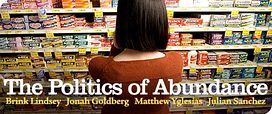A recurring criticism of my “libertarian center” thesis — see Jonathan Chait, or Ramesh Ponnuru, or Jonah and Peter Beinart in a recent “What’s Your Problem” segment — is that it’s obviously wrong because it’s at odds with current political trends. In recent years, the argument goes, politicians have been winning elections by stressing social conservatism and economic populism, i.e., the very opposite of the “fiscally conservative, socially liberal” position I’m touting.
I have some quibbles with that analysis of current trends, but I’ll concede that, especially on economic and spending issues, anti-libertarian forces have the momentum right now. But that’s really beside the point I’m trying to make. My critics are focusing on which way the pendulum is swinging. By contrast, I’m talking about which way the whole clock is moving.
Of course there are political cycles, which on economic issues are often influenced by business cycles. So, let’s see, after the ’90s experience of superheated labor markets, stock market booms and then bubbles, the explosion of the Internet, the collapse of the Soviet Union, and endless triumphalist hype about globalization and the “new economy,” we’ve been confronted with a recession, a prolonged stock market bust, a prolonged funk in job creation, accounting scandals, terrorist attacks and anxieties, and a failed war. Further, presiding over this hangover period has been a bumblingly incompetent administration that is at least nominally associated with free-market views. Is it really surprising that, at this juncture, there is an increased appetite for populist rhetoric and nostrums promising greater economic security?
What I’m interested in, though, is net movement over the course of numerous political and business cycles. My claim is that this net movement has been in a direction that can fairly be called libertarian. In certain key dimensions of social life, I really think this is beyond serious dispute. Conservatives today are much more liberal than their counterparts a generation ago when it comes to race relations, sex, the role of women, and censorship. And liberals today are much more appreciative of the power of market competition, and much more aware of the limits of government policy, than their predecessors in the days of the New Frontier and Great Society.
Looking ahead, I believe there are sound reasons for expecting, if not breathtaking further libertarian breakthroughs, at least the preservation of the basic character of the new, more libertarian social order. And, in response to Julian’s essay, let me say that these reasons go beyond the connection between the progress of mass affluence and a shift toward more libertarian attitudes. In addition, mass affluence produces conditions that create pressure for generally libertarian policies, regardless of what various political factions may happen to want. First, abundance leads to greater pluralism — and thus a “thinner” consensus on values, and thus strong opposition to government enforcement of one group’s creed at the expense of others. Second, under conditions of abundance, continued economic growth is increasingly reliant on a more decentralized, more flexible, more entrepreneurial economic system. For healthy growth to continue, market-friendly policies are a necessity.
If I’m right, then over the longer term, a libertarianish political movement would have the big advantage of riding a historical tailwind. No movement can avoid reverses from time to time, but a movement dedicated to market-led growth and tolerance should be able to achieve real successes over time. And should such a movement fail to emerge, then I expect we will continue to see economic populists and traditionalist conservatives winning some battles while losing the war.

